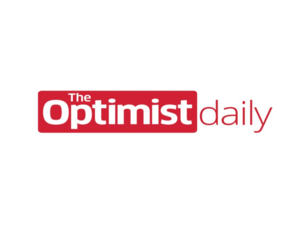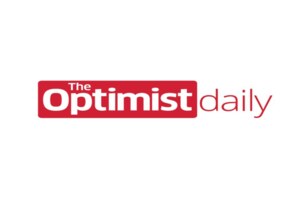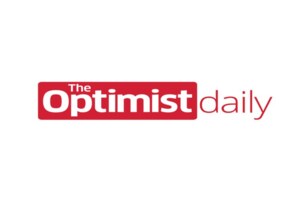“Life is like riding a bicycle, to keep your balance, you must keep moving.” – Albert Einstein
This past year has created challenges and cataclysmic life shifts for everyone, and while every person’s pandemic experience is unique, what we do have in common is the changed perspective that comes from having the ground beneath our feet ripped out from under us.
Even at The Optimist Daily, while we all work for the same organization and share similar day-to-day professional lives, our pandemic experiences have been vastly different. Our writers span the globe, so we’ve lived under different pandemic protocols. Some of us are parents managing online schooling, others are fresh out of college and navigating the real world for the first time in isolation. Some reside in big cities and were hit early by the realities of Covid-19, while others dwell in the Costa Rican jungle and have been spared from strict lockdowns. The upside to our radically different perspectives, other than sharing humorous stories from our different daily realities, is that we get the chance to brainstorm daily solutions from a multitude of different angles. Most recently, we’ve been thinking a lot about what a return to some semblance of normal will look like for all of us.
To wrap our heads around this next chapter, a few of the writers at The Optimist Daily have compiled their thoughts on both their pandemic experiences and reflections on the world we are returning to. From these different vantage points, we hope you might find some resonance, a bit of perspective, or perhaps those points of difference that help shed new light on your unique experience of our post-pandemic reality.
Arielle Tiangco
My Covid-19 experience does not follow the usual narrative of social isolation, perpetual mask-wearing, and endless Zoom meetings. I read about people who went through months without interacting with real humans, or who are trapped within the confines of their tiny concrete boxes in a congested concrete jungle, and though I try to empathize, I cannot imagine their struggle.
No, I spent my 2020 where the real jungle meets the sea, in a small and remote beach town on the Pacific coast of Costa Rica, a tiny spec on the Nicoya Peninsula that I’ve called home for the past four years.

Now, that’s not to say I didn’t experience my share of Covid-induced 2020 blues. Although my backdrop was arguably more picturesque, it wasn’t always pretty.
My initial concerns when the pandemic hit us exactly a year ago weren’t really about contracting the virus. I was worried about the survival of my fiancé’s business, a hostel that was quickly emptying as tourists trickled out of town. I worried about our wedding that was planned for August of that year (canceled). Really, I should have been worried about our relationship that we thought would last a lifetime, or at least a long time (ended).
The absence of tourists made our one stretch of road that the town is made up of even more lush and primitive. The critters of the jungle made themselves less scarce, comfortable in the quiet. But the town was far from calm. People went into survival mode, breaking into houses to search for food or money to fuel their drug addictions. Many of my friends lost their incomes and their homes so we all started living together. Our already small social circles became smaller—tight to the point of strangling.
Bored and frustrated, those left in town had nothing better to do than to distract themselves from their own woes with the scandals of others. Relationships became tense, rumors spread like wildfire, and conflict abounded in our Pura Vida paradise.
Yet when I reflect on the curveballs of this past year, I can’t help but realize that the losses I sustained in my life only made room for unexpected gains. Of course, I must recognize my privilege in this. I am so fortunate to not have lost anyone close to me to Covid-19, and although my personal financial situation became precarious, that of my parents remained stable, lending me the comfort of a safe place to retreat to should I need it.
I mourn the missed wedding (it would have been beautiful), but am grateful that the pressure of the pandemic forced me and my partner to come to the painful conclusion to end things before we got married. I grieve the loss of my partnership with my best friend but celebrate the companion I found in myself. And besides, saying that I had once been engaged adds a bit of intrigue to new conversations, doesn’t it?
I find that I feel nothing but gratitude for the global pause. How many generations of twenty-something-year-olds had the chance to stop, catch their breath, and reflect on the path they were making for themselves.
Especially now, when the world seems to spin faster and faster, it was a blessing to stop. Though the abrupt halt was disorienting and uncomfortable, that dizziness from excessive spinning eventually stilled. With the end of the pandemic in sight, whether we’re back in our childhood rooms at our parents’, gathering ourselves after a hard year, or if we’re embarking on an unfamiliar professional path, or if we’re standing alone on the beach, with a newfound confidence in our singular capabilities, all that’s left to do is to look straight ahead with a clear mind and step into ourselves.
Kristy Jansen
The Optimist Daily recently ran a story about how to cope with the anxiety of getting back into the world after spending a year in social isolation and pandemic-induced lock down.
It’s true, I’m anxious about what’s going to be next. The vaccine roll out is ramping up, the case load in my county has moved from the highest level of alert to the next level down, triggering a return to campus for elementary and middle schoolers. Restaurant dinning is starting to open up again. There is talk in our staff meetings about returning to the office by mid-summer. I should be thrilled and delighted with all this positive movement. Instead, it feels more complicated.
I’ve been suffering a bit of lockdown-induced depression. As the year has dragged on, the heightened stress of fear and isolation has kept me in emotional survival mode. Now that there is a sense that things may be easing up, all the suspended emotions that have been suppressed are rushing back in, and I am feeling grief, loss, and anger, as well as excitement and anticipation about what might come next.
The burnout is real too. Some days, I have just enough energy to get the very basic daily tasks done. I’m mentally exhausted, under-stimulated with new experiences or new social exchanges and overstimulated with too much screen time. I feel like I’ve been holding my breath through the seasons, trying to just sit with for the present moment and release expectations. A suspension of everything else besides my household and my remote-work, spending far too much time with streaming services, yoga pants and ice cream.
I don’t think I’m alone in this. While this opportunity to step back from the “before” times and to reflect has led to beautiful insights about what really matters in our lives, as well as new deepening in close relationships, there is still so much uncertainty about how we will function in a society also undergoing transformation. Not to mention the actual losses that so many have experienced. The prospect of going back into the world for many of us now feels overwhelming.
An internet search on traumatic stress and Covid-19 returns a plethora of scholarly articles on how this experience has affected our mental health. Pretty much all of us are experiencing some measure of grief, anxiety, depression, or turmoil linked to just how much we’ve been forced to change our habits, for a loss of income, loss of life, or loss of free movement.
So, the question I am left with is how to move forward with grace? The key, I believe is to focus on forgiveness: forgiving ourselves for all that we have not yet accomplished, because this has been a tough year. Forgiving our close friends and family members for the ways they have hurt us both intentionally and as the collateral damage of their own struggles; forgiving our communities and our leaders for their failures to show up when we needed them most. If we are locked in resentment, justified anger though it may be, we cannot move forward. In a recent Zoom-based event I was lucky enough to participate in, I heard quotes on this subject from two essential thinkers on this topic that have stuck with me. First, from the late Gerald Jampolsky, “Forgiveness is giving up all hope for a better past.” Best known for his book, Love is Letting go of Fear, Jampolsky also wrote deeply on the healing power of forgiveness, and how this can conceptually free us from personal traumas. The other was from Nelson Mandela, one of the architects of South Africa’s truth and reconciliation programs, and the concept of restorative justice in general. As he was leaving his decades of captivity he is reported to have expressed this concept, “Forgiveness liberates the soul, it removes fear. … That’s why it’s such a powerful weapon.” I think this is the key for unlocking the fear of moving forward out of grief and loss and finding my footing in a newly refreshed world.

Despite some major rough patches in this year of forced togetherness, my relationship with my husband is in many ways stronger than ever. He’s been a great friend and wonderful partner to sit through the pandemic with. I forgive him for all the stress we have inflicted on each other, and I forgive myself too. My son is a delight, and will be 15 in just a few weeks. His natural smarts have been on evidence as he’s learned to function in an all-remote learning environment while staying close to family and thankfully also out of adolescent mischief. Our relationship has become deeper this year, and I’m more confident than ever in his ability to thrive in the world, whatever the next chapter brings. I doubt we would have had this chance to learn about each other in this way if we had all still been in our typical rushing around lifestyles. I don’t know what to forgive him for, but I do forgive myself for all the times I got frustrated and all my failures as a parent. I’m sure there are many.
As we return to socializing with friends and family outside of our household, to working alongside co-workers in offices, traveling for work or for fun, and all the other markers of regular life that we enjoyed in the before times, I know this experience will stay with us all. I’ll be braiding forgiveness and gratitude into each hug, each smile I give. I look forward to releasing this energy back into the world and moving forward to what comes next.
Amelia Buckley
“Vaccines will be available for all Americans who want them by May 1.” I read this statement first with glee, then with panic. The idea of hugging friends again, of traveling, of being able to visit my parents stress-free is so joyous for me, but it’s immediately followed by a racing stream of thoughts of every responsibility I’ve put on hold.
I have been extremely fortunate during the pandemic. I have not had to face the loss of a loved one or unemployment. I didn’t have to juggle trying to parent and work under one roof, and the mild climate of California made escaping the house for walks and beach days relatively easy, even during the winter months. However, as we look at a return to some semblance of ordinary, I realize I did sacrifice the stress of forward progress during the pandemic.
At first I was upset by the fact that I couldn’t travel or move to a new city during the pandemic. But soon, this lack of autonomy over life decisions became a sort of security blanket. I came to almost relish the lack of control. “Nobody is hiring right now” excused me from thinking about my professional future, while “cities are hotspots for outbreaks” eliminated the pressure to stretch outside my comfort zone of sleepy Santa Barbara. Even the small decreases in emissions and pollution during shutdowns momentarily quelled my ever present environmental angst about the future of our planet.
On a more personal level, physical containment to Southern California spared me and my partner from having to address the future of our relationship when we inevitably move to different cities, and the inability to visit friends served as my reasoning for losing touch with some of them after our college experience ended last year.
Faced with the prospect of physical and social freedoms once again, it feels like I’ve opened a can of worms I’ve been hiding under my bed for 13 months. It turns out that I won’t be able to let Covid-19 serve as my decision-making proxy for too much longer. And although part of me is still worried out about all that “normal” entails, I am starting to overcome my shock and panic and even get a little excited.

I’ve started researching exciting potential new cities to call home. I’m going to visit friends I haven’t seen in over a year and maybe take the trip to New Zealand I’ve always dreamed of. After a few tough conversations with my partner, we’ve realized we can’t control the future, but we can be happy for each other’s new opportunities and bask in the here and now of our joyous relationship. So when it’s my turn, I’m going to welcome that shot in my arm not with fear, but with optimism and ambition about all the new choices I get to make in the near future.
________________________
ABOUT THE AUTHORS:
Amelia Buckley is a staff writer for the Optimist Daily based in Santa Barbara, CA. As a lover of the outdoors, Amelia is passionate about crafting stories that focus on critical global issues that impact our environment and natural spaces.
Arielle Tiangco is a new addition to the writing team at the Optimist Daily based in Santa Teresa, Costa Rica. When she’s not walking her dog on the beach, Arielle enjoys writing about social change, innovations in sustainable development, and practical life adjustments we can make as individuals to impact our world in a positive way.
Kristy Jansen is Chief Content Officer at the Optimist Daily, as well as serving as Executive Director at TOD’s publishing partner, the World Business Academy. Her passions include conscious mass media, socially responsible entrepreneurialism, intentional communities, nonviolent civil resistance, regenerative economies, mental health skill-sets, smart science fiction and, of course, the positive power of rational optimism.












